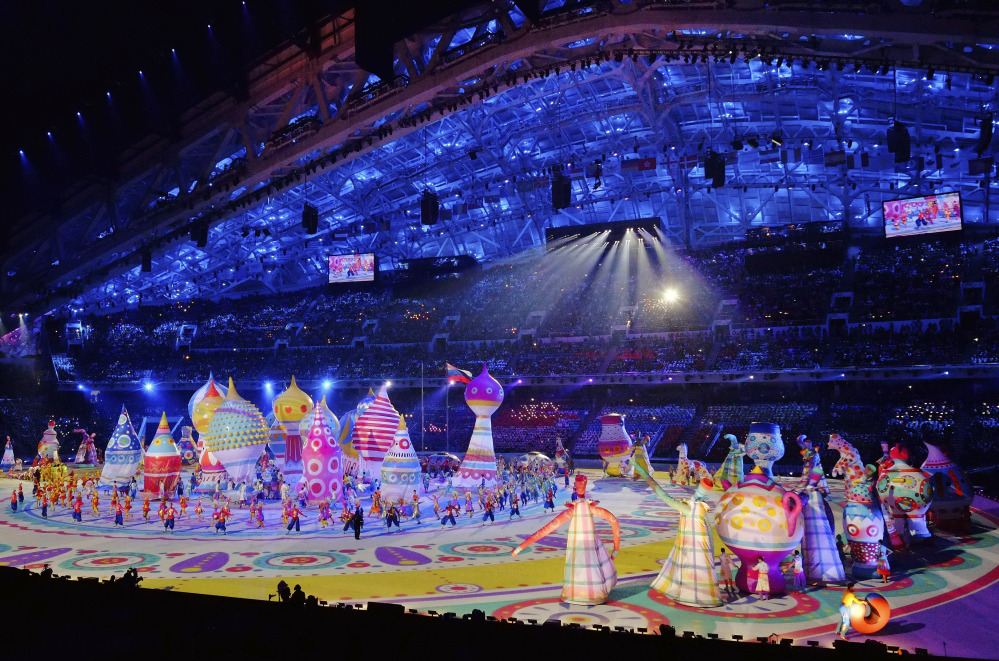SOCHI, Russia — All right, so that crazy segment with the immense flying horses was well done. So was most of the other stuff.
And man, did the Russians ever need it.
After the angst and storm of previous days, Friday night’s Opening Ceremony of the 2014 Winter Olympics delivered. For two hours, security concerns and construction troubles were forgotten as Games organizers staged one of the better versions of what amounts to the planet’s biggest halftime show.
In fact, this halftime show was even better than the Super Bowl halftime show. That one didn’t feature killer amplified music from Russian classical composers.
Friday’s did. The pageantry was impressive, despite one minor technical glitch. So was the parade of athletes, which had no glitches. Plus, no stray dogs were killed in the process. Although one was seen walking about the concourse shortly before the music and spectacle began.
As a bonus, there were welcome eyebrows raised when the ceremonies’ usually boring speeches took a slight detour into a place no one expected — with subtle yet pointed references to Russia’s controversial “Gay Propaganda” ban that has rightly drawn international scorn.
Thomas Bach, head of the International Olympic Committee, said halfway through his speech that the Games must be held “with tolerance and without any form of discrimination for whatever reason.”
Those words drew loud applause from the athletes sitting behind Bach as well as the entire stadium. More surprising was a phrase uttered by Sochi Organizing Committee president Dmitry Chernyshenko, who told the crowd that “when we come together in all our diversity, it is the Olympic Games that unite us.”
Again, there was an ovation after that sentence. Perhaps the word “diversity” in Russian doesn’t carry all the connotations it does in English. But the spectators clearly decided on their own interpretation. And after Bach’s remarks, you could sense thousands of eyes turning toward Russian president Vladimir Putin, sitting in his private box, for reaction.
There was none, of course. Putin has the most relentless stone face on the planet. So who knows what he made of it all? Brian Boitano, the Bay Area figure skater and 1988 gold medal winner, is here as part of the official U.S. delegation sent by President Obama. And as one of delegation’s openly gay athletes, Boitano hoped that his presence would quietly send the proper message.
“Ultimately, it would be great to change perceptions,” said Boitano, adding that he and the other U.S. delegates’ primary mission was to “support our athletes” at the ceremonies and competition.
Putin, it is said, has his own perception-changing mission — to erase the stereotype of Russia as a dour, sullen nation. Friday’s ceremonies were planned with that in mind. During the “pre-show” segment, for instance, a large Russian military choir in full uniform busted out a version of Daft Punk’s poppy “Get Lucky” song.
When the actual program began, there was the usual assortment of creatures and animation soaring across the stadium roof, with dancers below. Putin grinned when the Olympic mascots appeared. He did not smile when one of the high-tech lighting stunts failed — with just four, not five, snowflakes morphing into the five Olympic rings.
It wasn’t the first time such a goof has marred a Winter Games ceremonies. Four years ago in Vancouver, the Olympic torch itself malfunctioned when it failed to rise out of the ground properly. But given the construction troubles and corruption allegations that have surrounded these Olympics, the lighting malfunction seemed symbolic.
Once more, however, the march of athletes into the stadium tended to make everyone forget the outside world. It’s always the best 40 minutes or so of the evening. The USA team received a nice, if not raucous, reception from the Russian audience, even if the American parade uniforms featured wild stars-and-stripes sweaters that appeared to have been knitted by a psychedelic grandma.
In a nice touch compared to previous Opening Ceremonies, organizers here staged the athletes’ march very early in the night—allowing them to see almost the entire show — and allowed them to sit in the stands rather than stand on their feet for two hours. The reviews were positive.
“Words can’t describe what I witnessed live with my own eyes,” said one USA team member, freestyle skier Devin Logan. “It was the coolest experience of my life.”
Also as usual, the loudest and most emotional scene occurred when, per tradition, the home team marched into the stadium last. The noise was deafening. Every Russian in the building had probably wondered at some point, during the travails of assembling the $51 billion worth of venues and infrastructure, whether this moment would really happen.
But it did. And an hour later, the Olympic torch was lit in tandem by two of the nation’s most historically famous winter athletes — former figure skater Irina Rodina and former hockey goalie Vladislav Tretiak.
In the United States, Tretiak is best known as the Soviet Union goalie who was benched halfway through the “Miracle On Ice” game at the 1980 Olympics, won by the USA. But here, Tretiak is celebrated for the three gold medals he won in other Olympics.
He deserved this moment. So did the average Russian citizens who have had to endure the Olympic preparation travails — failure to pay workers, forcible evacuations to clear out Games sites — that were foisted on them by their leaders. Two hours of spectacle doesn’t solve all problems. But it shows you what can happen with some magnificent creativity and . . .you know, diversity.
Um, is Putin still smiling?
Send questions/comments to the editors.



Comments are no longer available on this story